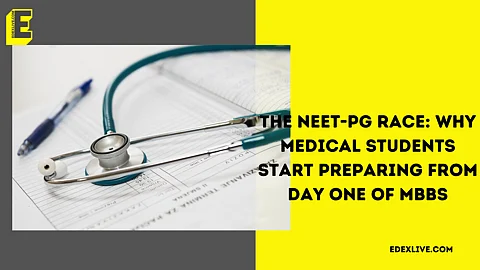

The journey from cracking the National Eligibility-cum-Entrance Test - Undergraduate (NEET-UG) to pursuing postgraduate medical studies is no longer a linear path.
It involves battling a flood of coaching apps, fierce competition, and a system that nudges students toward prioritising exams over education. This competition to secure a coveted NEET - Postgraduate (PG) seat has redefined how medical students approach their MBBS curriculum.
From lecture halls to coaching apps
Dr Anurag, an MBBS student, sums up the prevailing mindset: “More than half of the students start preparing for NEET PG from their first year itself.”
Online coaching platforms lure students in early with the promise of shortcuts to success. Many rely on video lectures and notes optimised for NEET-PG, sidelining their college textbooks and academic readings. Ironically, these notes are often enough to ace subjective college exams, creating a vicious cycle where students question the need for deeper engagement with core medical subjects.
But it’s not just about missing lectures. Practical clinical shifts, the backbone of medical training, are often skipped.
“Coaching classes promise to cover clinical aspects, but nothing can replace real interaction with patients,” says Dr Anurag. He emphasises that this over-reliance on online classes robs students of opportunities to discover their true interests. Instead, students chase ‘trending’ specialisations like radiology or general medicine without understanding whether they truly align with their skills or passions.
A system that breeds pressure
Dr Rishiraj Sinha, Senior Resident at the Department of Transfusion Medicine and State Convenor of the Indian Medical Association - Junior Doctors' Network (IMA JDN) Delhi, highlights the dual-edged sword of early preparation.
“Students feel immense pressure seeing their peers start coaching early. They willingly or unwillingly jump into the rat race, often losing touch with patient care and the critical doctor-patient interaction skills that are irreplaceable in clinical practice,” he points out.
This hyper-focus on NEET-PG often results in regret.
Dr Sinha recalls, “I’ve seen many colleagues leave their PG programmes midway because they realised the specialisation didn’t suit them. Without proper exposure during MBBS, students are making uninformed choices.”
The issue isn’t solely student-driven.
Dr Sinha points out that poor infrastructure and a lack of proper faculty in many medical colleges force students to depend on external coaching resources.
While these resources help fill gaps, they often perpetuate the idea that attending college classes and practical shifts is a waste of time, further widening the gap between education and examination.
The coaching industry’s role
Dr Utsava Bhattacharjee, Director of Reflex at Gooded Technologies, provides a broader perspective on the shift from traditional offline coaching to online platforms.
“Earlier, students used to prepare for NEET-PG during internships or after completing MBBS. With the advent of online apps, preparation now starts as early as the second year,” he explains.
But this shift is not purely academic.
Coaching platforms benefit financially from extending students’ preparation timelines. “If a student starts subscribing in their second year, companies can monetise them for multiple years instead of just one,” Dr Bhattacharjee notes.
Social media further fuels the pressure. “The hierarchy of branches, colleges, and constant peer comparisons on social platforms amplify FOMO (fear of missing out). Students feel they need to start preparing earlier or risk falling behind,” he adds.
The cost of the race
The consequences of this culture are profound. Medical students often miss out on the broader, formative experiences of MBBS life — be it engaging in diverse clinical postings, interacting with patients, or even enjoying the journey of learning medicine.
Instead, they’re laser-focused on cracking an exam that now seems to define their worth as doctors.
This narrow focus also skews career choices.
Dr Bhattacharjee emphasises that students often chase branches perceived as lucrative or prestigious, like radiology or general medicine, without understanding what these fields entail.
“Many residents leave their PG programmes midway because they realise it’s not what they wanted. Medicine is vast, and students need to spend time figuring out where their passion truly lies,” he says.
Finding the balance
The message is clear: ‘Balance is key’.
While NEET-PG preparation is crucial, it shouldn’t come at the cost of clinical exposure, practical skills, or personal growth.
“A dedicated year of preparation is enough,” says Dr Anurag and adds, “But starting too early, without fully engaging in MBBS, often leads to a loss of interest and misplaced priorities.”
Dr Sinha agrees, stressing the importance of using MBBS years to explore interests, attend clinical shifts, and build a strong academic foundation. “Skipping this step often leads to regret later,” he says.
As the medical education landscape evolves, the challenge is to ensure students don’t just prepare for exams but also prepare to become competent, compassionate doctors. After all, the true goal of medical education isn’t just cracking an exam — it’s saving lives.
